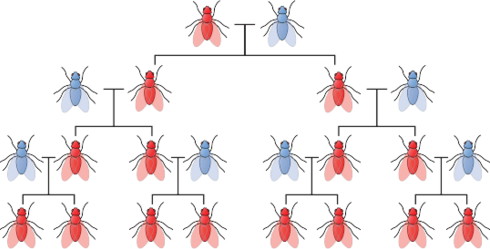Gene drives and societal narratives
By Brigitte Nerlich,
Making Science Public
| 08. 21. 2020
A review of nine previous posts about gene drives, most by the same author
Some days ago, I came across an interesting virtual conference (HT @Sarah_A_Hartley) about gene editing which includes a session on ‘societal narratives’. I have written quite a bit about societal narratives of gene editing, but more recently I became involved in the issue of ‘gene drive’, that is, “a system of biased inheritance in which the ability of a genetic element to pass from a parent to its offspring through sexual reproduction is enhanced”. This is a naturally occurring twist in the laws of inheritance that scientists can use (with the help of gene editing) “to develop [artificial] gene-drive modified organisms for public health, conservation, agriculture, and other societal purposes, for example, by suppressing populations of mosquito species that transmit human diseases such as malaria, dengue, Zika, and chikungunya among others” (Gene drives on the horizon, 2016).
I suddenly asked myself: Are there any societal narratives emerging around gene drives? Cloninghas societal narratives, recombinant DNA has societal narratives, genetic engineering has societal narratives (I can’t wait for @matthewcobb’s book about this), genomics has societal narratives, genetic...
Related Articles
By Scott Solomon, The MIT Press Reader | 02.12.2026
Chris Mason is a man in a hurry.
“Sometimes walking from the subway to the lab takes too long, so I’ll start running,” he told me over breakfast at a bistro near his home in Brooklyn on a crisp...
By Diaa Hadid and Shweta Desai, NPR | 01.29.2026
MUMBRA, India — The afternoon sun shines on the woman in a commuter-town café, highlighting her almond-shaped eyes and pale skin, a look often sought after by couples who need an egg to have a baby.
"I have good eggs,"...
By George Janes, BioNews | 01.12.2026
A heart attack patient has become the first person to be treated in a clinical trial of an experimental gene therapy, which aims to strengthen blood vessels after coronary bypass surgery.
Coronary artery bypass surgery is performed to treat...
By Staff, ScienceDaily | 01.05.2026
Scientists at UNSW Sydney have developed a new form of CRISPR technology that could make gene therapy safer while also resolving a decades-long debate about how genes are switched off. The research shows that small chemical markers attached to DNA
...




